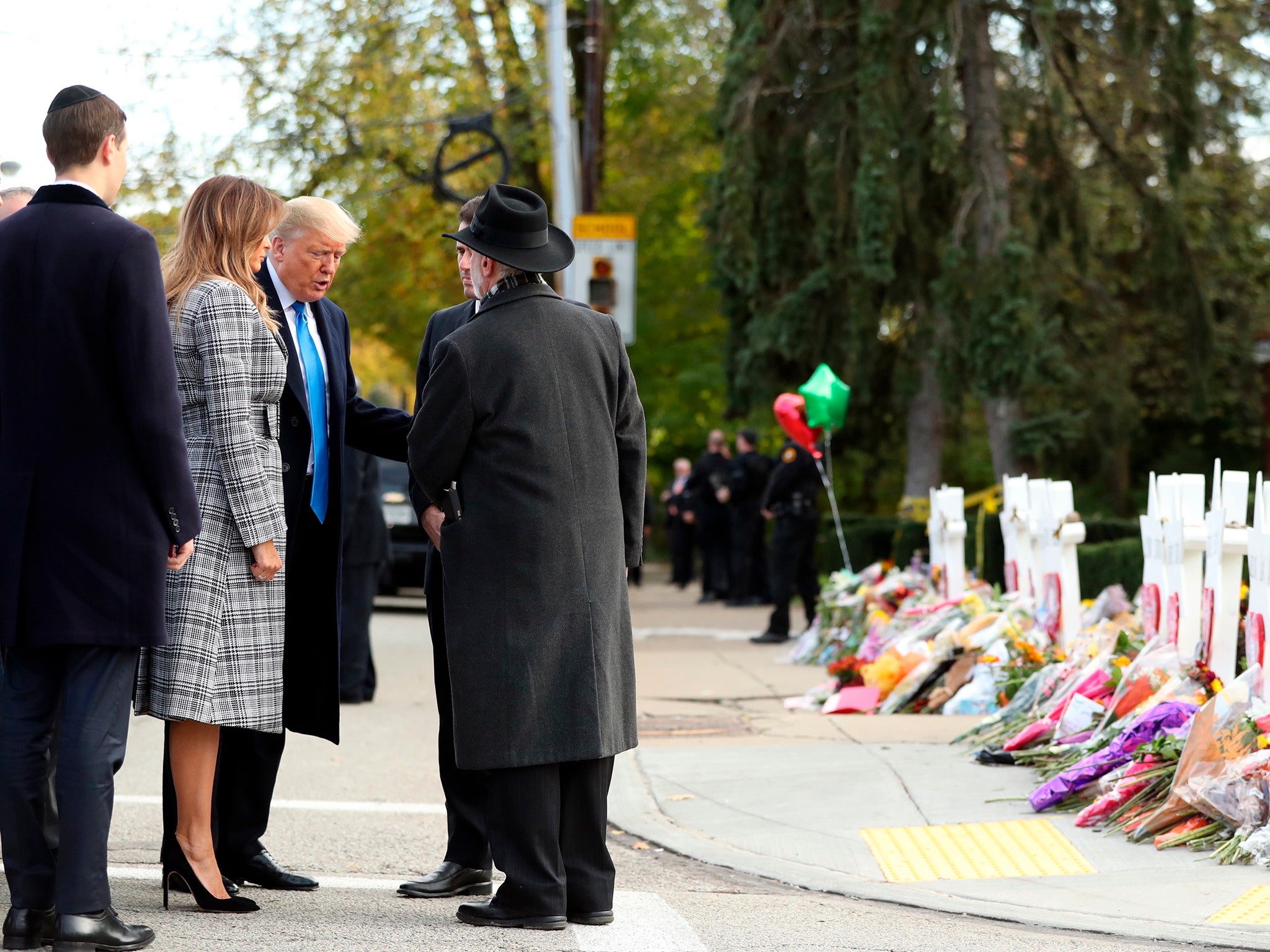Israel government speaks out in support of Trump after Pittsburgh synagogue visit
Many American Jews hold the president responsible for the recent rise in anti-Jewish vitriol

When president Donald Trump arrived Tuesday at the Tree of Life synagogue in Pittsburgh to pay his respects to the 11 victims of a mass shooting three days earlier, the only public official standing there to greet him was Israel’s ambassador to the US, Ron Dermer.
The symbolism was stark, and it didn’t end there. A few hours later, another prominent Israeli official, Naftali Bennett, took to Twitter to defend Mr Trump from critics, including some in the American Jewish community, who said the president’s divisive, inflammatory language sowed the seeds for the deadliest anti-Semitic attack in the US in recent memory.
Israel’s right-wing government has become Mr Trump’s prime validator in the anguished days since the massacre in Pittsburgh – reflecting its loyalty to a president who has backed its interests but also deepening a rift with American Jews, many of whom hold Mr Trump at least partly responsible for the rise in anti-Jewish vitriol over the last two years.
“Factually, the guy has been a huge friend to the Jewish state,” said Mr Bennett, who serves as Israel’s minister for diaspora affairs, at the Council on Foreign Relations on Wednesday.
The slaughter in Pittsburgh had already laid bare fissures between Israel and American Jews after Israel’s Ashkenazi chief rabbi refused to refer to the Tree of Life as a synagogue because it is Conservative, a non-Orthodox branch of Judaism not recognised by religious authorities in Israel.
But the discord over a presidential visit – a time-honoured ritual in the aftermath of such a tragedy – underscores how wide the gulf has become, at a time when the White House and the Israeli government are in lock step on every major issue yet a majority of American Jews voted against the president.
Mr Dermer, a one-time aide to prime minister Benjamin Netanyahu, played such a visible role in Pittsburgh largely because state and local officials shunned Mr Trump. Jared Kushner, the president’s son-in-law and senior adviser who is close to Mr Dermer, had invited him to attend, according to a person briefed on the matter.
The optics were awkward for the White House, but Mr Trump was clearly grateful for Mr Dermer’s support. He flew back to Washington on Air Force One.
Mr Bennett, who leads a right-wing religious party, the Jewish Home, which is part of Mr Netanyahu’s coalition government, flew to Pittsburgh on his own initiative to mourn the victims. While there, he met Jason D Greenblatt, who serves as Mr Trump’s Middle East envoy and was taking soundings for a visit by the president.
On Tuesday, Mr Bennett posted a stream of tweets defending the president, just as Mr Trump was leaving the synagogue to the distant chants of protesters marching through the Squirrel Hill neighbourhood, carrying signs that said “Words matter” and “President Hate is not welcome in our state”.
The next day, in New York, Mr Bennett continued his defence of Mr Trump. The president, he said, supported Israel in its battle with Iran and recognised Jerusalem as the capital of Israel. His son-in-law, Mr Kushner, is Jewish; his daughter Ivanka is a convert to Judaism; and his grandchildren are Jewish, as are many of his advisers.
“What,” he asked, “could be more pro-Jewish?”
To many in the American Jewish community, Mr Trump’s responsibility is clear. Bend the Arc, a progressive Jewish group in Pittsburgh, sent the president an open letter urging him not to visit the city “until you fully denounce white nationalism”.
“Our Jewish community is not the only group you have targeted,” said the letter, which had more than 84,000 signatures. “You have also deliberately undermined the safety of people of colour, Muslims, LGBT+ people, and people with disabilities.”
Some American Jewish leaders, particularly from Republican and right-leaning groups, condemned efforts to blame Mr Trump, accusing his critics of exploiting a tragedy to score political points during an election season.
Mr Greenblatt, the president’s Middle East envoy, insisted that Mr Trump spoke out powerfully against anti-Semitism. “Those seeking their destruction, we will seek their destruction,” he wrote in an essay for Fox News, quoting the president.
By drawing Israel close, some analysts said, Mr Trump was simply finding another way to play to his political base.
“The more they wrap themselves in Dermer and Netanyahu and the Israeli flag, the more it seals the 20 to 25 percent of the American Jewish community they already have,” said Jeremy Ben-Ami, president of J Street, a left-of-centre, pro-Israel advocacy group. “And it also seals the evangelical base.”
Mr Bennett conceded his views were not popular among liberal American Jews, who have grown increasingly estranged from the policies of the Netanyahu government. But that does not seem to trouble him much. His job as an Israeli official, he said, is to defend the interests of the Jewish state. It is a perspective that puts Bennett closer to Mr Trump’s right-wing supporters than to many American Jews.
“From the Israeli point of view, evangelicals are far more reliable than liberal Jews,” said Martin S Indyk, a senior fellow at the Council on Foreign Relations. “They support the best president for their right-wing agenda that they’ve ever had.”
“For Bennett,” he said, “it’s Israel first.”
The New York Times
Join our commenting forum
Join thought-provoking conversations, follow other Independent readers and see their replies
Comments
Bookmark popover
Removed from bookmarks